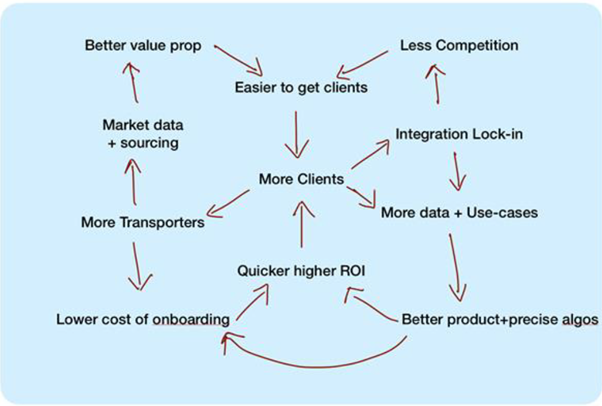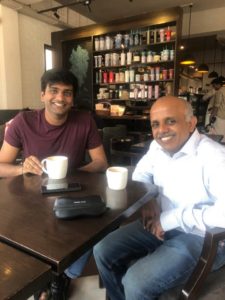The quaking aspen approach to the enormity of logistics
The Logistics sector in India, that has largely been conventionally (read manually/inefficiently) driven, is now increasingly turning towards digitization and automation, considerably boosting India’s prospects in building a robust foundation for a growing economy. The logistics sector in India currently accounts for over 14% of GDP ($380b), employs over 22m people, and is expected to grow at a CAGR of 10.5%
An opportunity in inefficiency (over $100b)
In India, Logistics costs as a percentage of GDP (14%) exceeds that of other comparable countries — 10–11% in BRIC countries, 8–9% for developing nations. Developed markets such as the USA and Germany are even more competitive, with the ratio ranging between 8–9.5%. This upward pressure in logistics costs in India could be ascribed to the lack of efficient inter-modal and multi-modal systems.
Nearly one-third of India’s logistic cost (~4% of GDP) is due to inefficiency such as lower road & rail speeds, higher than required inventory levels and theft & damages. [Source: Edelweiss, India Logistics Report 2018]. Several factors are expected to combine to reduce these inefficiencies over the next decade, including a favorable tax regime, improved infra leading to reduced transit times, warehouse consolidation, and rapid adoption of technology solutions. As if to herald this disruption, Logistics has (finally) been granted infrastructure status.
To make sense of this disruption, businesses across the world have begun adopting technology at a faster pace than ever before. Individual challenges have been countered with point solutions. However, the movement towards integrated supply chain systems that dynamically coordinate across customer, distributor, supplier and production is an essential stepping stone to navigate across the range of stakeholders, and solutions around cloud, big data, IoT, AR etc.
With the above thesis, and backed by the experience of working with companies like Blowhorn and Xpressbees that serve large shippers, and companies like Lenskart, Myntra, FirstCry and Flipkart that manage complex supply chain networks, we sought to further understand this sector’s blueprint. Our conversations with heads of supply chain, financial controllers and so on revealed one key insight — Enterprises were thinking of freight more strategically as a competitive value center, but were unable to find best-in-class technology solutions.
Chennai, coffee and hot chocolate
What added further caffeine (and cocoa) to our research was a hot Chennai afternoon, sometime in early-August. We had made our customary visit to Saravana Bhavan, completed meetings for the day and invited Nitin (CEO, Pando) for a conversation. It was one of those meetings where the deck is kept aside, the entrepreneur and you understand the problems of the space and end up having a meaningful conversation on how to address these problems step by step , delivering value to customers, and in the process, building a massive global business. The answer to this highly networked industry is network in itself and hence the name Pando.
In parallel, one of his colleagues was sitting at a table nearby, closing a client call right behind us. We got really interested in speaking to her as well and while Nitin called Abhijeet, Pando’s Co-Founder and CTO, we got to understand a lot of unique cases that Pando was able to solve for with their network-first approach. It was clear that their team was their biggest asset — Ashok Vasan, a senior sales leader who built I2’s global GTM, Computer Associate’s channel partnership strategy, Dell’s call center operations who had recently joined Pando (and moved to Chennai from Singapore) to head their GTM, was only symbolic of the quality of the team.
The 40 mins meeting slot stretched into a couple of hours!
b. Shippers and transporters are managing billions in freight through silo-ed systems and broken processes
c. Shippers and transporters are taking note, and are ready to change

Pando has built a platform that allows enterprises to make sense of all their individual point solutions, and connect directly into their vendor network across the value-chain covering suppliers, manufacturers, customers, fleet-owners, aggregators, and technology providers.
While individual players within the fragments of network claim to provide a monitoring platform, Pando stands as a more robust and agile system as it can not only digitize and automate existing processes, but find bottlenecks and value pockets, optimize to remove them and deliver real cost savings.

Through our conversations with with some of the leading global enterprises that are Pando’s clients and others it became clear that Pando contributed to direct, quantifiable bottom-line benefits. It was encouraging to see that Pando’s capabilities were being leveraged to chalk out group-level freight strategies. The conversations echoed one thing — the network is priceless!
However, to validate this further, we also spoke to one of the largest FMCG players in the country who was not using Pando. When we asked them about their freight management problems, they told us that they were happy with the existing suite of solutions, that they had sufficiently cracked the issue, and that nothing further could be done. We introduced Pando anyway to them to see where it goes. Today, they are a client of Pando!
This is only the beginning
The journey towards building an enterprise grade global freight network will take constant growth and refinement. The problem grows as the network grows, and the network is growing exponentially. Untangling the severely crisscrossed web, optimizing it, getting intricate details to work, and executing it to a practically viable solution is a work of art, world class software, precision and keeping your eye always on the pulse of the system. Interestingly, some of Pando’s India clients are in discussion to take them global.
While Pando is doing all of that, we are happy to announce investment of $5.1m by funds advised by Chiratae Ventures India Advisors to lead Pando’s $9m Series A round. As Pando charts its path to become a global freight network, Chiratae is extremely excited to be a part of its journey. Personally, we cannot wait to see Pando grow through the grit, enthusiasm and in-depth understanding of every nuance of the business that Nitin, Abhijeet, Ashok and their whole team brings to the table.

